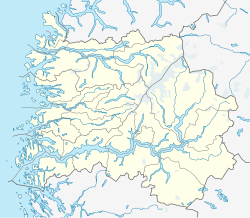Bremanger Church
| Bremanger Church | |
|---|---|
| Bremanger kyrkje | |

View of the church
|
|
| 61°53′32″N 5°31′56″E / 61.8921°N 5.5323°ECoordinates: 61°53′32″N 5°31′56″E / 61.8921°N 5.5323°E | |
| Location |
Bremanger Municipality, Sogn og Fjordane |
| Country | Norway |
| Denomination | Church of Norway |
| Churchmanship | Evangelical Lutheran |
| Website | Bremanger Church |
| History | |
| Consecrated | 4 September 1914 |
| Architecture | |
| Status | Parish church |
| Functional status | Active |
| Architect(s) | Anders Karlsen Eid |
| Style | Langkyrkje ("long church") |
| Completed | 1914 |
| Specifications | |
| Materials | Wood |
| Administration | |
| Parish | Bremanger |
| Deanery | Nordfjord prosti |
| Diocese | Diocese of Bjørgvin |
Bremanger Church (Norwegian: Bremanger kyrkje) is a parish church in Bremanger Municipality in Sogn og Fjordane county, Norway. It is located in the village of Bremanger on the island of Bremangerlandet. The church is part of the Bremanger parish in the Nordfjord deanery in the Diocese of Bjørgvin.
The wooden "long church" was built in 1914, and it was originally called Bremangerpollen Chapel. The name was changed to Bremanger Church in 1952. The church is located at Hauge, in the innermost part of the Bremangerpollen bay in the municipality of Bremanger. The church, with a seating capacity of 400, was consecrated on 4 September 1914 by the bishop Johan Willoch Erichsen. The architect Anders Karlsen Eid made the designs.
Historically, there was a church at Grotle, just west of the village of Bremanger. In 1865, the aging church at Grotle was torn down and the people living in the northern part Bremangerlandet island were without a church of their own. The nearest church was Frøya Church to the south, on the island of Frøya. The people who lived further north on the island complained that the journey to that church had become too long and strenuous. Going by boat around Novene was often a risky undertaking, which kept people from going to church. The people felt that if they got a church in their own village, many more people would get the opportunity to listen to the words of the Lord. These people, even the Vicar, had to eventually yield to such a strong argument, and so the work was started in the 1890s to erect a new church in the village of Hauge (now called Bremanger).
...
Wikipedia


